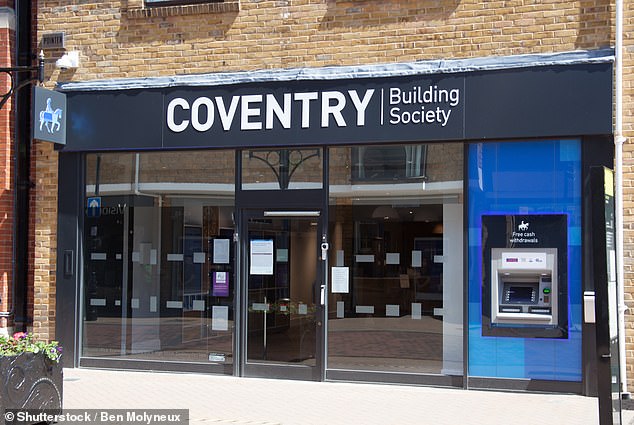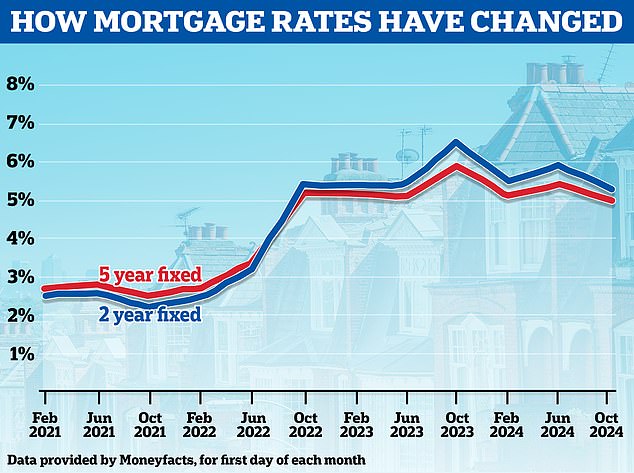Mortgage interest rates will rise again, experts warn. This is the reason
Experts are warning that mortgage rates are about to rise again after Coventry Building Society announced it will increase home loan costs.
Mortgage rates have fallen steadily in recent months and last week five major mortgage lenders announced rate cuts on the same day.
Since the beginning of July, the mortgage with the lowest five-year fixed rate has fallen from 4.28 percent to 3.68 percent.
Meanwhile, the lowest two-year interest rate in that period has fallen from 4.68 percent to 3.84 percent.
Back up: Two mortgage experts say interest rates are about to rise after the events of the past few days in troubled markets. Pictured: Nicholas Mendes (left) and David Hollingworth (right)
However, there are signs that the downward momentum is about to stop – or even reverse.
Coventry Building Society has announced that several fixed interest rates will increase from Friday.
The Co-operative Bank has also announced that it will withdraw some of its lowest rates tomorrow evening.
The events of the past few days have unsettled the markets, said Nicholas Mendes, mortgage technical manager at broker John Charcol. This has led to an increase in interest rates on government bonds and interest rates on swaps.
“First, Andrew Bailey’s recent comments expressing expectations for larger or more frequent rate cuts have created some uncertainty,” Mendes said.
‘Several MPC members have expressed opposing views, indicating possible caution in future voting behaviour.
“Markets had priced in rate cuts for November and December, but expectations for December have softened somewhat, reflecting this uncertainty.”
“In addition, geopolitical tensions, particularly concerns over the conflict in the Middle East and its potential impact on oil prices, have increased market volatility.
“While fears escalated last week, talks in the US helped stabilize the situation somewhat. However, any further disruption could cause inflation to rise.”

Changing course: Coventry Building Society has announced that several fixed interest rates will rise from Friday
Mendes says this will likely impact the mortgage market, especially as lenders adapt to the changing conditions.
‘Given these factors, we expect some lenders to reprice their products, particularly among specialist lenders and smaller building societies.
‘If swap rates continue to rise, it is likely that the best mortgage deals, which already have tight margins for lenders, will start to reprice with a small adjustment upwards, with a wider repricing if competitors do the same.
‘Lenders typically price 14 days in advance, so if this trend continues any repricing is likely to occur before budget.’
Clear signs that mortgage rates will rise?
Mortgage lenders price their fixed mortgage rates based on the Sonia swap rate, financing targets, borrower demand and general economic sentiment.
Sonia swaps are the easiest way to interpret where fixed rates are headed.
Simply put, Sonia swap rates essentially show what lenders think the future holds in terms of interest rates.
When sonia swaps rise enough, it often results in a rise in the fixed mortgage rate, and vice versa when it falls.
In recent days, Sonia swaps have gone up again. On October 7, two-year swaps were 4.07 percent and five-year swaps were 3.81 percent.
That is a significant increase compared to September 20, when the two-year swaps were 3.82 percent and the five-year swaps were 3.52 percent.

Make a choice: in recent months, mortgage providers have lowered interest rates
David Hollingworth, associate director at L&C Mortgages, said: ‘The mortgage market has seen interest rates fall in recent months, but this may come to an abrupt end.
“Fixed interest rates depend on what the market expects to happen with interest rates and the uncertainty surrounding the upcoming budget. Mixed messages from the Bank of England and global unrest are driving up costs for lenders again.
‘Swap rates are a good indicator of the direction of fixed interest rates and have risen again.
“If that continues, improvements in fixed rates will come to a screeching halt and then rise again.”
However, John Charcol’s Nicholas Mendes emphasizes that he still expects mortgage rates to trend downward in the longer term.
Still, he advises everyone to enter the last six months of their current mortgage now.
“Any increase in mortgage rates will likely be temporary and not necessarily reflect the overall trajectory of interest rates over the next 12 months,” Mendes said.
‘It is important to emphasize that anyone nearing the end of their fixed rate mortgage should get a new deal now.
‘Continue to monitor the market, or better yet, hire a real estate agent to monitor the market for you and advise when a better deal becomes available.
“While nothing is guaranteed and several factors could delay the pass-through of rate cuts, it is important to take proactive steps to secure the best deal, rather than taking a wait-and-see approach.”
Some links in this article may be affiliate links. If you click on it, we may earn a small commission. That helps us fund This Is Money and keep it free to use. We do not write articles to promote products. We do not allow a commercial relationship to compromise our editorial independence.
